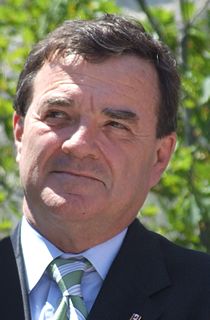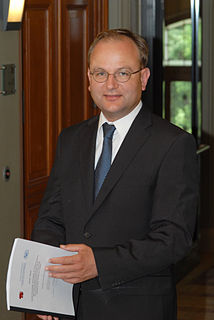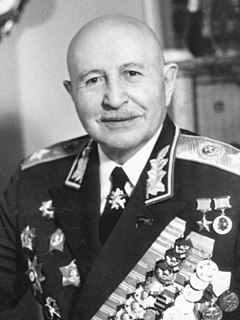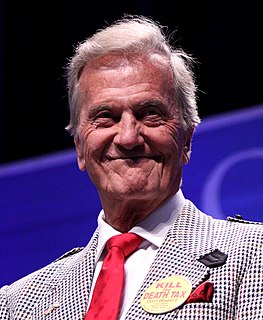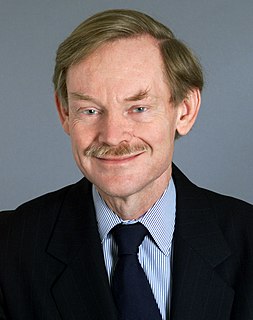Top 1200 World Economy Quotes & Sayings - Page 15
Explore popular World Economy quotes.
Last updated on November 15, 2024.
I remember being in the Ontario Legislature and the Liberals yelling over at me about the fact that the dollar was rising, and that was bad for business, and didn't I realize that. And I thought, 'What are you talking about?' The value of the currency in part, large part, reflects the world's view of the state of our economy.
All of the easy oil is gone and what's left is requiring more energy and money and this has an effect on everything. Our problem is that we've created an infrastructure that's so dependent on oil. As oil becomes more expensive we're going to be locked into the transportation modes that our economy depends on. So we really need to start building an alternative economy before we get caught in a trap of our own making.
In a democracy the responsibility for the Government's economic policies, which so affect the economy, normally rests with the elected representative of the people: in our case, with the President and the Congress. If these two follow economic policies inimical to the general welfare, they are accountable to the people for their actions on election day. With Federal Reserve independence, however, a body of men exist who control one of the most powerful levers moving the economy and who are responsible to no one.
In Donald Trump, you have someone who will bring real change to Washington, D.C. He's a bold leader. He's distinctly American. He doesn't play by the old-fashioned rules. He's going to Washington, D.C., break up the status quo, and I believe get this economy moving again and have America standing tall in the world.
One cannot walk into an April day in a negative way. With spring, each man's plans and hopes result in new efforts, fresh actions. All of which has a mighty important bearing on the economy. There are those of us who think that the psychology of man, each and together, has more impact on markets, business, services and building and all the fabric of an economy than all the more measurable statistical indices.
The public sector can only feed off the private sector; it necessarily lives parasitically upon the private economy. But this means that the productive resources of society - far from satisfying the wants of consumers - are now directed, by compulsion, away from these wants and needs. The consumers are deliberately thwarted, and the resources of the economy diverted from them to those activities desire by the parasitic bureaucracy and politicians.
I spent my whole life in the private sector, 25 years in the private sector. I understand that when government takes more money out of the hands of people, it makes it more difficult for them to buy things. If they can't buy things, the economy doesn't grow. If the economy doesn't grow, we don't put Americans to work.
I think what Republicans want is someone who will stand up and lead, who will take on the great challenges of the day, who will make the case that the path we're on isn't working; that the Obama-economy is a disaster, that Obamacare is a trainwreck, that our constitutional rights are under assault and that we need to restore America's leadership in the world.
The US economy, because it's so energy wasteful, is much less efficient than either the European or Japanese economies. It takes us twice as much energy to produce a unit of GDP as it does in Europe and Japan. So, we're fundamentally less efficient and therefore less competitive, and the sooner we begin to tighten up, the better it will be for our economy and society.
My solutions are to include Africa in the global economy, and not African charity, AIDS research, but African infrastructure development. And I think that Africa can import and needs everything the whole world can manufacture. And they have got enough money to pay for it. It's just that the money is in the ground.
We have created new idols. The worship of the ancient golden calf (cf. Ex 32:1-35) has returned in a new and ruthless guise in the idolatry of money and the dictatorship of an impersonal economy lacking a truly human purpose. The worldwide crisis affecting finance and the economy lays bare their imbalances and, above all, their lack of real concern for human beings; man is reduced to one of his needs alone: consumption.
It affects every aspect of our lives, is often said to be the root of all evil, and the analysis of the world that it makes possible - what we call 'the economy' - is so important to us that economists have become the high priests of our society. Yet, oddly, there is absolutely no consensus among economists about what money really is.
The recent period has been marked by a transformation to an economy that is more productive as competitive forces become increasingly intense and new technologies raise the efficiency of our businesses...While these tendencies were no doubt in train in the "old," pre-1990s economy, they accelerated over the past decade as a number of technologies with their roots in the cumulative innovations of the past half-century began to yield dramatic economic returns.
If you do the things that Britain needs to do - namely, withdraw from NATO, get rid of the bomb, and stop being aligned with one side of the Cold War - then presumably the run on the pound, the result in the stock exchanges of the world, will be fairly catastrophic for the economy. But some sort of political realignment is plainly what this country needs.
Without investments in research and science that will create the next Apple, create the next new innovation that will sell products around the world, we will lose. If we're not training engineers to make sure that they are equipped here in this country, then companies won't come here. Those investments are what's going to help to make sure that we continue to lead this world economy not just next year, but 10 years from now, 50 years from now, a hundred years from now.
We have won on the Arlov, Kursk, Belgorod, and Kharkov grounds. We won because the country was being defended not only by the army but by the entire Soviet people. The Socialist economy, Soviet political structure, and Marxist-Leninist ideology proved their unarguable excellence against the Fascist economy, Fascist political structure, and Fascist ideology of Germany.
My biggest disappointment was, of course, the coup attempts, ... The economy was proceeding very well, but in 1989 we had the most serious coup attempt and ... many of the investors who were set to come here had to tell me that they chose to go to other countries because of the uncertainty brought about by (the coup attempt.) If that had not happened, I'm sure our economy would just be booming today.
Money has to undergo a metamorphosis again, it has to relinquish its role in the market economy and engage in an economy of capacities. Then we would be concerned with human creative productivity. And we would come full circle, since each human being can then act within his company as co-creator of the future, can - in full dignity - contribute to shaping this future.
Getting the economy back on its feet is properly viewed as an investment in future prosperity. When businesses and consumers confront attractive investment opportunities, often the only way to seize them is by borrowing. The same is true for government. Contrary to the pronouncements of critics of economic stimulus, these investments will not impoverish our grandchildren. Continuing to allow the economy to languish in recession is the surest way to impoverish them.
America is home to the best researchers, advanced manufacturers, and entrepreneurs in the world. There is no reason we cannot lead the planet in manufacturing solar panels and wind turbines, engineering the smart energy grid, and inspiring the next great companies that will be the titans of a new green energy economy.
I'm one of those people who believes that part of the greatness of the United States is our private sector. It's what we do as private citizens for ourselves and our companies. And our economy is essentially the wonder of the world because, in fact, it's produced so much for us over the years. That's not government that does that.
I was making my work as transparent as possible, without equivocations, without calling attention to itself, without apology. There's a lot of conventions in the art world that are not to be transgressed, but my economy of means doesn't abide by those strictures. There's no reason to abide by them. I don't have any vested interest in it.
I never knew how much we consumed. It seems as if we are all appetite, as if a human being is simply a bundle of needs to drain the world. It’s no wonder there are wars, no wonder the earth and water and air are polluted. It’s no wonder the economy collapsed, if Eva and I use so much merely to stay alive.
We could choose to leave as a country split and an economy disjointed, struggling to make our way in a new world outside the E.U. Or we can come together as one United Kingdom, confidently seizing new global opportunities as we build a prosperous, secure nation fit for the future challenges we will face.
When I say the economy is shrinking, it's the economy of the 99%, the people who have to work for a living and depend on earning money for what they can spend. The 1% makes its money basically by lending out their money to the 99%, on charging interest and speculating. So the stock market's doubled, the bond market's gone way up, and the 1% are earning more money than ever before, but the 99% are not. They're having to pay the 1%.
Sometimes our definitions fall short. Take, for example, the way we view income and labor. It simply doesn't cover enough of the work that women, and in particular poor women, are doing - especially in their own households and the vast 'informal' economy in which most of the world's poorest people work.
There are over 2 million cars standing in front of red lights with their engines going. Then we have over 2 million times approximately 100 horsepower being generated as they are idling there, so that we have something like 200 million horses jumping up and down and going nowhere. Now, we have to count that in our economy when we begin to get down to what is the efficiency of the economy.
It's not a matter of if economies around the world becoming low-carbon, but when and how: through struggle and strife or through advancement and progressive leadership. Larry Elliot described it today as the 'Green New Deal.' It's a leadership we in Britain can provide, and from which our economy can benefit.
Agriculture is not crop production as popular belief holds - it's the production of food and fiber from the world's land and waters. Without agriculture it is not possible to have a city, stock market, banks, university, church or army. Agriculture is the foundation of civilization and any stable economy.
If the first casualty of war is innocence, then perhaps with each bullet fired, bomb detonated, leader overthrown, wall built, economy destroyed and family member killed, we are not creating goodwill and harmony, but rather another child who believes violence is the only means to bring about change in the world.
What I say is it's not that Obama hates America. It's not that he's a traitor, that he's a secret Muslim, that he's a Manchurian Candidate. He simply subscribes to an ideology that thinks it would be good for America to have a diminished economy and a diminished role in the world. In other words, Obama is all about what he perceives as global justice.
I take running for president and being president really seriously. It's a - maybe the toughest job in the world, right? And I knew that there was unfinished business from the successful two terms of President Obama, whom I had served, but that we needed to go further on the economy, on health care, and so much else.
The bottom line for housing is that the concerns we used to hear about the possibility of a devastating collapse—one that might be big enough to cause a recession in the U.S. economy—while not fully allayed have diminished. Moreover, while the future for housing activity remains uncertain, I think there is a reasonable chance that housing is in the process of stabilizing, which would mean that it would put a considerably smaller drag on the economy going forward.
All over the world, as governments retreat from their traditional duty to foster the common good and reconceive of themselves as mere managers of national economies, universities have been coming under pressure to turn themselves into training schools equipping young people with the skills required by a modern economy.
We are often told we are materialistic. It seems to me, we are not materialistic enough. We have a disrespect for materials. We use it quickly and carelessly. If were genuinely materialistic people, we would understand where materials come from and where they go to. But, at the moment, the entire global economy seems to be built on the model of digging things up from one hole in the ground on one side of the earth, transporting them around the world, using them for a few days, and sticking them in a hole in the ground on the other side of the world.
The Chinese public is deeply nationalist, which matters to China's unelected political leadership as much as U.S. nationalism does to American politicians. As China becomes the world's largest economy, there is meaningful public pressure for its power status to advance in parallel. Any alternative would be humiliating.

